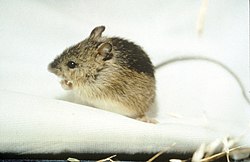Zapus hudsonius preblei
| Preble's meadow jumping mouse | |
|---|---|
 |
|
| Scientific classification | |
| Kingdom: | Animalia |
| Phylum: | Chordata |
| Class: | Mammalia |
| Order: | Rodentia |
| Family: | Dipodidae |
| Subfamily: | Zapodinae |
| Genus: | Zapus |
| Species: | Zapus hudsonius |
| Subspecies: | Z. h. preblei |
| Trinomial name | |
|
Zapus hudsonius preblei |
|
Preble's meadow jumping mouse (Zapus hudsonius preblei) is a subspecies of jumping mouse, endemic to the upland habitats of Colorado and Wyoming in North America. It is found nowhere else in the world. It is listed as Threatened under the United States Endangered Species Act; there is a major debate about whether it is a valid taxon.
The mouse is around nine inches long, and can jump in bounds of four feet when threatened. It usually travels slowly. It swims and climbs grass stems. It has long hind legs and a long, slender, scaly tail that it uses to communicate by making drumming noises. It also communicates using clucks and chirps.
The mice are born without hair (naked) and live nearly two years. They hibernate from mid-September to early May, building themselves a soft vegetation nest. The breeding season is from May to October.
Meadow jumping mice like to eat mostly plants, insects, spiders, slugs.
...
Wikipedia
